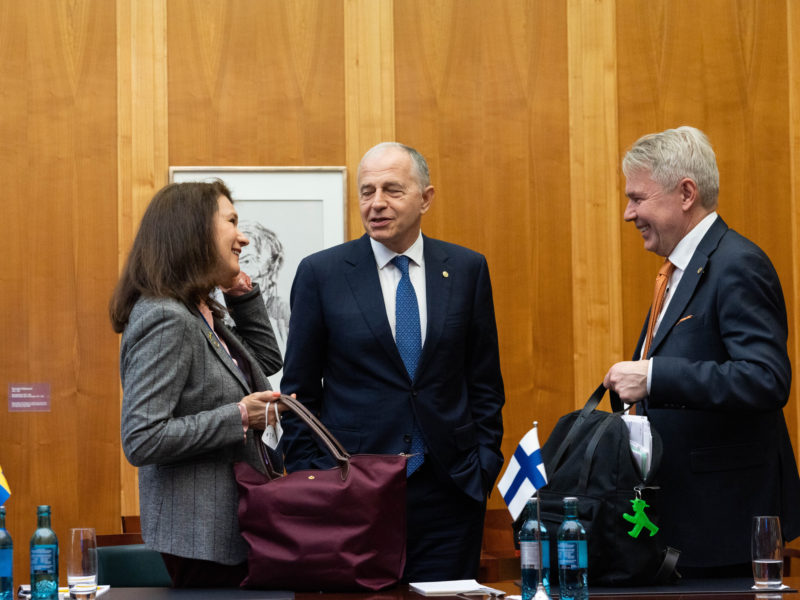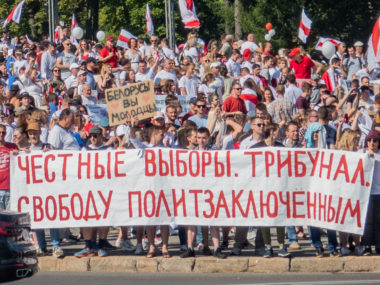Guest post by Elizabeth Radziszewski and Jeremy Berkowitz
Sweden’s and Finland’s recent decisions to join NATO marked a historic moment for the two Nordic states known for their neutrality. The move not only reflects evolving security concerns about Russia’s aggression in Ukraine but marks a shift that is set to end decades of accommodation toward Russia. It also sheds light on a broader question about why some rival countries—or those that have a history of tensions—sustain policies of accommodation over the years, and what pushes them to abandon such policies. Why would Sweden and Finland refrain from alienating Russia for years only to break suddenly with this tradition with their unprecedented decision to apply for NATO membership?
In most instances, accommodation—when positive gestures between enemies outnumber negative ones in a given year—is seen in scholarly research as a step towards terminating a rivalry, and is usually driven by shocks to the system, such as the onset of democratic transition or wars. Reciprocating cooperation helps to sustain this positive momentum. Yet in our research we have found that states can pursue accommodation in response to immediate threats from enemies and may do so with the aim of conserving resources and reducing the risk of war without necessarily aiming to terminate the rivalry. Put simply, accommodating enemies is a way to manage rivalries in a world full of constraints.
Accommodating an enemy in response to a threat presents domestic risks to leaders, who can be seen as weak and suffer electorally. Those costs for leaders can increase as cooperation with the enemy is prolonged. This is one of the reasons why international rivalries can last for a long time without a change in momentum. Yet Sweden and Finland pursued military non-alignment and restraint towards Russia for years. In Finland, for example, accommodating Russia during the Cold War through the policy of Finlandization meant that there was virtually no negative coverage in the media of the former enemy.
To shed light on this phenomenon we analyzed the sustainability of accommodation by looking at 30 years of data on rivalries (1966–1999). We examined what happens to accommodation one year after two states experience a militarized dispute and then at the subsequent four-year mark, for a total of five years. In 50 percent of cases, states extended accommodation to an enemy over the course of one year post-crisis. Yet in only 20 percent of the cases was accommodation sustained for five years. The Nordic states’ long-term accommodation of Russia has, in other words, been highly unusual, and it illustrates that even post-crisis, enemies can find ways to engage in some form of cooperative relationship short of rivalry termination.
What then distinguishes cases of extended accommodation from those instances where accommodation is short-lived? Looking at two types of constraints that states face—domestic weakness, captured by political and economic crises, and international limitations such as having multiple external enemies or large military disparities between enemies—our research shows that it is the international, power-based constraints that drive states to pursue positive gestures year after year.
Large differences in military capabilities are more likely to push a state to sustain accommodation over the course of five years in a post-crisis environment. Both Finland and Sweden could not match Russia’s military power. Their new policy of seeking NATO membership, which signals the end of sustained accommodation, could help alter this military imbalance. That both states would risk ending their long-standing accommodation can be attributed to strong assurances from the United States that their NATO bid would be accepted and thus dramatically alter the Nordic states’ power limitations with respect to Russia, since being a member of NATO provides security guarantees.
There are other forms of power-based constraints that push rival states to sustain their initial accommodation. Our analysis reveals that states with multiple external rivals have limited resources to manage a potentially large number of conflicts. This context, generally, pushes enemies to work together. Thus, greater alignment between Russia and China may not necessarily pose the risk of more future conflict. Faced with pressure to manage two powerful rivals, the US might seek to find more tangible areas for cooperation. If China and/or Russia were to reciprocate, then the possibility of more long-term improvement in rival relations might be possible.
Finally, the opportunity for extended accommodation is greatly diminished under specific domestic conditions. States experiencing economic or political crises are unlikely to sustain positive gestures toward enemies. In countries experiencing domestic problems, leaders often turn to more aggressive external policies. For example, after positive discussions on the status of Spanish Sahara took place in 1974, cooperative gestures were short lived and ceased in 1975 when the King of Morocco ordered a quarter of a million Moroccans to march into the disputed territory. The King’s declining domestic support was believed to inspire what became known as The Green March.
States should tread carefully when extending the olive branch to enemies undergoing internal turmoil even amidst ongoing cooperation. It just might turn out that their friendliness will not be reciprocated.
Elizabeth Radziszewski is an Associate Research Scientist at START where she co-leads the Global Responses to Asymmetric Threats project. Jeremy Berkowitz is a Lecturer in Political Science in the Division of Social Work, Behavioral, and Political Science at Prairie View A&M University.







